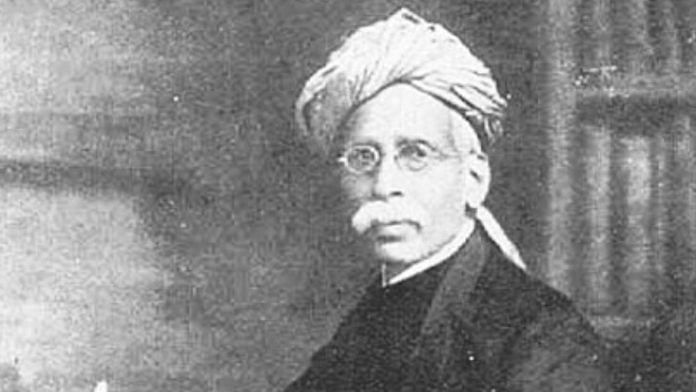On this day three years ago, Home Minister Amit Shah visited Satyabhamapur, a nondescript town 39 km northeast of Cuttack. The purpose? To campaign for the Bharatiya Janata Party ahead of the Lok Sabha elections, but also pay floral tributes to a man immortalised in the form of a small bronze statue, complete with his moustache and turban — Madhusudan Das — who led the linguistic movement that united Odisha.
“Madhu Babu’s contribution towards the social & economic upliftment of the people of Odisha is truly great. As a Chintak, patriotism was always at the fore in his creations,” Shah had tweeted. Shah is far from the only outsider to uphold this key figure of Odisha’s modern history, as the Congress party had also paid tribute to him just last year, while the Odisha Governor Ganeshi Lal, in 2019, had said that Das deserved the Bharat Ratna.
Both Mahatama Gandhi and B.R. Ambedkar had also held Das in high regard. While Gandhi labelled him as a “great philanthropist”, Ambedkar recognised his speech on caste and Dalit issues when writing The Untouchables and The Pax Britannica.
Born on 28 April 1848 in Satyabhamapur, Madhusudan Das was a lawyer by profession who, in his early fifties, gave the linguistic movement the impetus it needed by establishing an Odia socio-cultural organisation called Utkal Sammilani. He ultimately came to be known as ‘Utkal Gouraba’, or the pride of the ancient Utkala kingdom that was briefly referenced in the Mahabharata.
Also Read: Manoj Das—Marxist Odia writer who became Aurobindo’s disciple and hated ‘modernity’
Odisha’s linguistic movement
According to Dr Janmejay Choudhury for the April 2005 issue of state-run Odisha Review magazine, the Odisha linguistic movement had begun in the latter half of the 19th century under the British Raj, after centuries of fragmentation of Odia-speaking communities under various kingdoms.
The first proposal for a unification of these communities in a single state was presented in 1875 but was struck down in 1888 by Sir S.C. Bayley, then-Lt Gov of Bengal. The Odia language was banned outright from “official use” in the Odia-speaking district of Sambalpur in 1895, prompting widespread but unsuccessful protests, Dr. Choudhary added.
The linguistic movement seemingly had popular support as efforts on the ground continued into the early 1900s, but needed a figurehead from a privileged, institutional background to rally around and for the establishment to take seriously. And this figurehead also needed to understand the movement and lead it accordingly.
Enter Madhusudan Das, who belonged to a zamindar family part of the ‘Karana’ writer caste but “made a clean break with tradition and changed his religion” to Christianity in 1868, writer Hiranya Kumar Panigrahi says in his book Odisha of my Times.
“It is only after freeing himself from the fetters of tradition that he came out with brilliant ideas to usher in a new era of Odisha. Many nationalist poets, literateurs and adherents of Satyabadi school of thought follow him,” Panigrahi argues.
Dr Choudhary considers the Odisha linguistic movement to be “the first and pioneering attempt” of its kind, spearheaded by the Utkal Sammilani which first assembled at the tail end of 1903 and met every year in different parts of the region until Odisha’s creation in 1936.”
Also Read: Biju Patnaik, the two-time Odisha chief minister who was RAF pilot in World War 2
Das’ impression on the Indian judiciary
When Madhusudan Das wasn’t leading landmark linguistic movements, he was utilising the skills he’d developed over decades as a lawyer to bring a renewed focus to health issues in the region.
As documented by SN Sahu for Newsclick, Das flagged Odisha’s cholera problem to the Central Legislative Assembly in early 1923, hitting out at the Raj for not putting in place the required “budgetary provisions” in order to maintain an acceptable public health standard in rural Odisha.
A man of science and concerned for the deteriorating welfare of Odisha’s rural areas, Das also pointed out that the advancements made in the field of medicine and the related work to diagnose epidemic causes did not reach Odisha’s rural residents, who remained “victims of superstition” and powerless in the face of “recurring scourges”, Sahu says.
Interestingly, Das was the first Odia person to get a Bachelor’s degree, Master’s degree and an LL.B degree. While he went on to become an ace lawyer, Das, or ‘Madhu Babu’, was also popular as a prolific writer, poet and journalist. Patriotism emerged as a key theme in most of his literary works — Utkal Santan, Jati Itihash and Jananira Ukti are considered some of his most important poems.
Oriya poem by Madhusudan Das(Madhu babu). Speaks volumes about general character of our people. So very spot on!! pic.twitter.com/ZkI18mfGe9
— Tathagata Satpathy (@SatpathyLive) April 18, 2020
An English language newspaper from 1920 published from Cuttack and edited by Madhusudan Das. pic.twitter.com/zfyOPI8IzX
— Sampad Patnaik (@sampad_patnaik) September 23, 2021
A staunch feminist, Das fought an inherently patriarchal system to open the legal field for Indian women. While most credit Cornelia Sorabji as India’s first female lawyer, historians say that it was Das’ adopted daughter, Sudhanshubala Hazra, who broke all shackles to emerge as the country’s first female lawyer in 1923. In an interview with the New Indian Express, noted researcher Dr Basudev Das said that it was Madhu babu who fought Hazra’s case in the Patna High Court in 1921, eventually winning and instating her as a lawyer in 1923, almost a year before Sorabji.
Das died at the age of 85 in 1934, prior to the official creation of Odisha, but his ideas and contributions to the struggle for linguistic identity and provincial self-determination lived on in the minds of other major figures in the struggle for Indian Independence.
(Edited by Zoya Bhatti)



